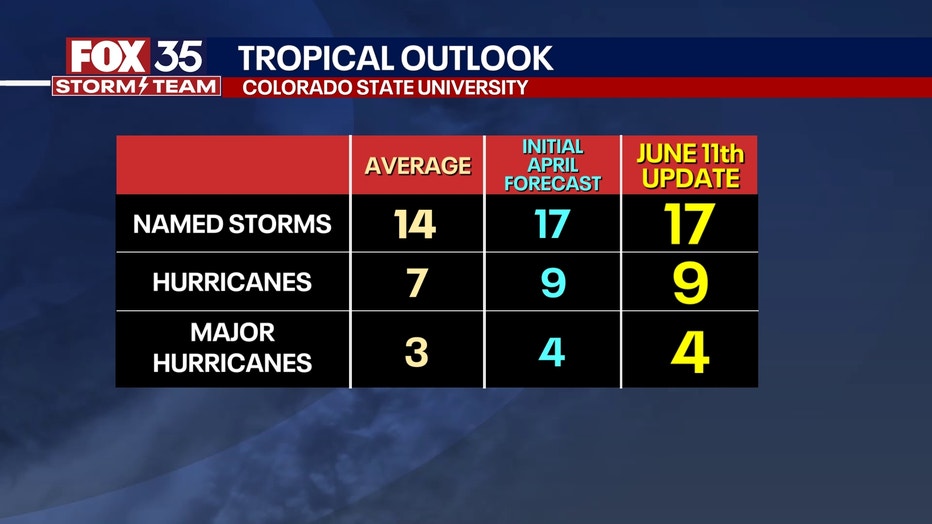2025 Atlantic hurricane season: How experts predict a busy hurricane season

Live Q&A: 2025 Atlantic Hurricane Season
FOX 35 meteorologist Noah Bergren and Laurel Blanchard answer your questions about the 2025 Atlantic hurricane season.
ORLANDO, Fla. - Leading hurricane researchers are maintaining their forecast for an above-average 2025 Atlantic hurricane season.
Colorado State University (CSU) said Wednesday that above-average sea-surface temperatures in the subtropical eastern Atlantic Ocean and Caribbean Sea were a primary factor in their prediction of nine total hurricanes this year.
The CSU team is predicting 17 named storms during the Atlantic hurricane season, which began on June 1 and runs through Nov. 30. Of those 17 storms, researchers forecast nine to become hurricanes and four to reach major hurricane strength (Category 3 or higher), with sustained winds of at least 111 mph.
FOX 35 Storm Team Meteorologist Brooks Garner breaks down some of the most commonly asked questions when it comes to how experts predict a busy hurricane season.

The 2025 Hurricane Season Begins: No Activity Expected in First Week
FOX 35 Meteorologist Laurel Blanchard breaks down what could be expected this hurricane season and if there is any activity expected for the first few days of the 2025 Atlantic Hurricane Season
Why are scientists saying this will be a busy hurricane season?
Scientists at CSU think this year will have more hurricanes than usual because the Atlantic Ocean is warmer, the Pacific Nino cycle is normal and winds in the upper atmosphere look like they will make it easier for storms to grow. Previous "analog years" are used to compare this pattern to other seasons to help make this prediction.
What do warm ocean waters have to do with hurricanes?
Hurricanes need warm water to form — like fuel for a fire. This year, the ocean in the main hurricane zone is warmer than normal, which gives storms more energy to grow stronger.
What is El Niño or La Niña, and why does it matter?
These are names for changes in ocean temperatures in the Pacific Ocean that can affect weather around the world. This year, we’re in a "neutral" zone — not El Niño or La Niña — which means nothing is stopping hurricanes from forming in the Atlantic.

Hurricane season begins in Florida: How to protect your home
The 2025 Atlantic hurricane season runs June 1 through Nov. 30. FOX 35 Storm Team Meteorologist Brooks Garner shares how to protect your home should a natural disaster occur.
What are upper-level winds, and why are they important?
Winds high up in the sky can tear storms apart if they’re too strong. This year, those winds are expected to be gentler, which helps hurricanes grow and stay strong.
This year's outlook is partially based on previous ‘analog years.’ What are those?
Hurricane researchers look at past years that had similar ocean and wind patterns, kind of like matching puzzle pieces. If those years had lots of hurricanes, it’s a clue that this year might be similar. They're known as "analogs" and are yet another tool to help predict the future.
What is CSU predicting for 2025?
CSU experts believe we will see:
- 17 named storms (storms big enough to get a name)
- 9 hurricanes (stronger storms with winds over 74 mph)
- 4 major hurricanes (really strong ones — Category 3 or higher)

Why do people trust Colorado State University (CSU) to make these forecasts?
CSU has been making hurricane predictions for more than 40 years, and they were actually one of the first groups in the world to try this! They use science, data and computers — not guesses — and even other weather experts watch their forecasts to help prepare. So when CSU speaks up, people listen.
STAY CONNECTED WITH FOX 35 ORLANDO:
- Download the FOX Local app for breaking news alerts, the latest news headlines
- Download the FOX 35 Storm Team Weather app for weather alerts & radar
- Sign up for FOX 35's daily newsletter for the latest morning headlines
- FOX Local: Stream FOX 35 newscasts, FOX 35 News+, Central Florida Eats on your smart TV
The Source: This story was written based on information shared by FOX 35 Storm Team Meteorologist Brooks Garner and gathered from Colorado State University (CSU) and FOX Weather.

